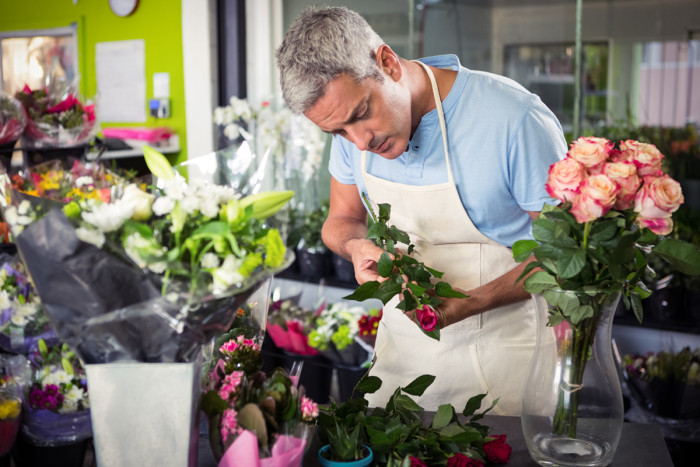Florist
Kaihoko Putiputi
Alternative titles for this job
Florists sell plants and fresh flowers and use them to design and create floral arrangements.
Pay
Florists usually earn
$24-$28 per hour
Source: careers.govt.nz research, 2020.
Job opportunities
Pay
Pay for florists varies depending on experience.
- New florists can expect to earn the minimum wage.
- Florists with more experience can earn up to $28 an hour.
- Florists who manage or own a florist business can earn $28 an hour or more.
Source: careers.govt.nz research, 2020.
- PAYE.net.nz website – use this calculator to convert pay and salary information
- Employment New Zealand website - information about minimum wage rates
(This information is a guide only. Find out more about the sources of our pay information)
What you will do
Florists may do some or all of the following:
- design and create fresh flower arrangements
- buy flowers, plants and decorations from sales representatives
- keep plants and flowers fresh and healthy
- help people choose plants and flower arrangements
- arrange delivery of flowers
- keep records and accounts
- attend markets and auctions and bid for flowers.
Skills and knowledge
Florists need to have knowledge of:
- flowers and plants
- trends in floristry
- how to care for and arrange cut flowers
- ordering procedures
- sales and basic business skills
- occupational health and safety procedures.
Working conditions
Florists:
- work regular business hours, but may also start early or work evenings and weekends
- mainly work in shops and retail outlets
- may work in cold conditions
- may have to travel to make deliveries, purchase flowers, or prepare arrangements.
What's the job really like?

Sally Double
Florist
How did you get your florist job?
"I got a job placement at Scent Floral Boutique while studying an 18-week Level 3 Floristry Certificate through NZMA, which led to being offered a position. I now work full time there."
What’s your typical day like?
"We start the day off by setting up the shop with posies for customers who haven’t pre-ordered, processing fresh flowers that arrive from the market and organising a variety of deliveries around town. Throughout the day we’re always caring for the flowers, keeping the store clean and serving customers.
"Sometimes I walk or drive to deliver flower orders. We also have our corporate clients who receive weekly arrangements in vases, and plenty of orders come in from our website and over the phone too."
What do you enjoy about your work?
"Even though it’s technically a customer service role, it’s a creative one. Using my qualification and choosing my line of work has made it particularly enjoyable too.
"It’s also a very social job. So because you’re in the public eye, you need to always be aware of how you’re presenting the business."
What advice would you give to future florists?
"I know that you don’t necessarily need a qualification to be a florist, but in my case it did help to start my career.
"Take the time to learn about the styles of floristry you’re interested in, from formal or informal flower arrangements and styling."
Florist video
Claudia Boyo talks about life as a florist – 2.27 mins.
so if you're going to be a florist, be prepared to do some sweeping. Hi,
my name is Claudia and I'm a florist.
As a florist, we create flowers for customers that walk in.
We work on weddings and events,
and we also create dried flower arrangements as well. So today I am picking out
some flowers to make a bouquet for a customer that's come in.
What I do is I pick out a range of different flowers,
some with big heads and lots of petals, some with smaller heads,
and some with longer heads. So this creates quite a wild flower theme,
which is really nice. So 3 main things I do in my job is going and picking
up supplies. So that could be the fresh flowers at the wholesalers.
Making the bouquets themselves is really important,
and also communicating with customers. So at the moment,
I am replying to some brides who have asked for some wedding florals and we
reply with a quote for them.
The way that we price flowers is there's a price that we pay for them at the
wholesale market, and then we add our markup on top of that.
Our markup changes depending on how much work is required. I think people skills
are really important. Customers are a really big part of the job,
especially brides if you end up being a wedding florist. Also,
being very creative and having a creative eye.
This job is very artsy and craftsy, especially with our dried flowers,
because we make so many products out of them. We have a lot of fun here,
and that's what I mean by it doesn't feel like work. I studied for 5 years to
become an architect,
but I found that it wasn't very hands-on and it wasn't very practical.
So I really like working with my hands. When I realised just that I wasn't very
happy, I decided to move across. I had zero training when it came to floristry,
and I just taught myself - a lot of YouTube videos, a lot of trial and error,
a lot of going and buying flowers,
and some things work and some things don't work. My 2 favourite things about my
office are, of course, the flowers and the foliage.
So working around such beautiful nature. And then the other thing is my staff,
you're often working together to create quite large pieces that require more
than 1 person,
and that's where the team element is really great because you can bounce ideas
off one another.
And being open to different ideas and different ways of thinking is really
important too. Changing my job was incredibly scary,
but taking the leap was the best thing I ever did,
and I absolutely don't regret it. And at the end of the day,
I'm happy and that's what mattered to me.
Entry requirements
There are no specific requirements to become a florist as you gain skills on the job.
However, most employers prefer you to complete a qualification such as a New Zealand Certificate in Floristry (Level 2, 3 or 4).
Secondary education
There are no specific secondary education requirements to become a florist. However, business studies, painting, sculpture, photography and printmaking are useful.
Personal requirements
Florists need to be:
- creative and artistic, with a good eye for colour, texture and detail
- confident and good at communicating
- adaptable
- skilled at planning and organising.
Useful experience
Useful experience for florists includes:
- work that involves customer service or handling money
- window-dressing work
- work in plant nurseries.
Physical requirements
Florists need to:
- be reasonably fit
- have good hand-eye co-ordination
- not be allergic to pollen or flowers.
Find out more about training
- New Zealand Professional Florists
- secretary@nzprofessionalflorists.co.nz - www.nzprofessionalflorists.co.nz
What are the chances of getting a job?
Chances better with experience or a qualification
Chances of getting a job as a florist are best for those with at least three years' experience and a floristry qualification.
Employers prefer to hire new florists who have basic skills and knowledge in floristry.
According to the Census, 1,410 florists worked in New Zealand in 2018.
Types of employers varied
Florists may work for:
- florist shops
- supermarkets
- nursery retail centres
- flower wholesalers
- floricultural (ornamental flower farming) businesses.
Florists can also run their own business, work from home, or set up their own online delivery business.
Sources
- New Zealand Professional Florists Incorporated (NZPF) website, accessed October 2020, (www.nzprofessionalflorists.co.nz).
- New Zealand Professional Florists, executive members, careers.govt.nz interview, November 2020.
- Ministry of Business, Innovation and Employment, Florists - Occupation Outlook, accessed October 2020, (www.occupationoutlook.mbie.govt.nz).
- Stats NZ, '2018 Census Data', 2019.
(This information is a guide only. Find out more about the sources of our job opportunities information)
Progression and specialisations
Florists may progress to set up their own floristry business, or move into management roles.
Last updated 31 March 2025

